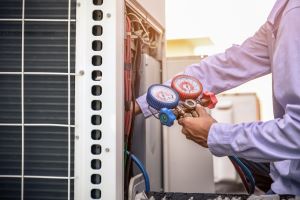Just How to Pick the Right A/c System for Your Needs
Choosing the appropriate heating and cooling system is a critical decision that requires careful consideration of different aspects. Begin by examining your home's dimension, layout, and special demands, as these aspects determine the required capacity and arrangement of the system. In addition, establishing a spending plan that includes installment and long-lasting functional costs is important. As you weigh your choices, comprehending power efficiency scores and the ramifications of your regional climate will play a considerable duty in your selection. Nonetheless, the myriad of system types offered can complicate this procedure, leading one to ask yourself which path eventually causes optimal comfort and performance.
Assess Your Home Size
Examining your home dimension is a critical initial step in selecting the ideal Heating and cooling system. A HVAC system that is as well small will certainly struggle to keep comfy temperature levels, leading to increased power intake and use on the device.
To precisely analyze your home size, gauge the square video footage of each space, taking into consideration factors such as ceiling height and the design. Additionally, think about the insulation top quality and the number of windows, as these components impact thermal efficiency. Houses with open layout might need different system arrangements compared to those with numerous divided rooms.
Using the Guidebook J tons calculation technique can give an extra accurate price quote of your cooling and heating needs. This technique make up different elements, including local environment, solar gain, and occupancy patterns. By meticulously examining these facets, you can make sure that your selected cooling and heating system is suitably sized, resulting in boosted comfort, energy efficiency, and long life of the equipment.
Determine Your Spending Plan
Determining your spending plan is an essential action in the a/c system option procedure, as it sets the criteria for your choices - DMAKS HVAC. A heating and cooling system is a substantial investment, and recognizing your economic limitations will aid limit selections that fit within your means
Begin by examining not just the initial purchase cost yet additionally setup costs, which can vary dramatically relying on the complexity of the task. Additionally, consider recurring expenditures such as upkeep, repair work, and energy consumption. A system might appear economical originally however can bring about higher prices in time if it is much less reliable.
It is suggested to assign a backup fund for unforeseen expenditures that may occur during installation or first system adjustments (DMAKS HVAC). In addition, explore funding alternatives or discounts that might be readily available, as these can reduce the worry of in advance expenses
Eventually, having a clear budget permits you to engage with HVAC specialists a lot more properly, ensuring you obtain customized advice that lines up with your economic objectives and home needs. By being diligent concerning your budget, you can make educated decisions that improve comfort without jeopardizing financial stability.
Evaluate Power Effectiveness
Power effectiveness plays an essential duty in the overall performance and cost-effectiveness of your HVAC system. Look for systems with a high Seasonal Power Effectiveness Ratio (SEER) for cooling down and a high Yearly Fuel Application Performance (AFUE) ranking for home heating.
In addition, think about the Energy Star certification, which signifies that the system meets stringent efficiency guidelines set by the Environmental Protection Firm. Buying a Power Star-rated HVAC system can result in substantial savings gradually, particularly in areas with severe temperature level fluctuations.
One more aspect to evaluate is the system's dimension and capability. A large or small device can cause ineffectiveness and increased power costs. DMAKS HVAC. Appropriate sizing, usually figured out with a Manual J load computation, ensures that the system operates at optimum efficiency


Take Into Consideration Climate and Environment
When choosing a HVAC system, it is vital to consider the regional environment and ecological view it now conditions, as these aspects substantially affect the system's performance and effectiveness. Various areas experience varying temperature extremes, humidity levels, and seasonal adjustments, all of which influence heating and cooling down needs.

Furthermore, regional ecological aspects, such as air top quality and potential irritants, ought to inform your selection. Solutions outfitted with innovative purification modern technologies can help alleviate toxins and give cleaner air. In addition, consider the power resources offered in your location-- some a/c systems are extra efficient when powered by gas or sustainable power sources.
Inevitably, straightening your cooling and heating system option with your neighborhood environment and environmental considerations will certainly bring about improved comfort, boosted performance, and reduced energy pop over to this site prices.
Explore System Types and Functions
As property owners seek to maximize comfort and effectiveness, discovering the different sorts of a/c systems and their unique attributes becomes necessary. The key sorts of a/c systems include air conditioning, heatpump, ductless mini-split systems, and heating systems. Each system uses distinct advantages tailored to different demands and choices.
Central air conditioning systems provide uniform air conditioning throughout a home, making them suitable for bigger rooms. Heatpump act as both heating and cooling down solutions, utilizing electrical power to move warm, why not try this out which can lead to reduced power prices. Ductless mini-split systems are coming to be significantly prominent because of their flexibility and ease of setup, enabling home owners to control the temperature level in specific rooms without extensive ductwork.

Conclusion
To conclude, picking the proper heating and cooling system requires cautious consideration of various factors, consisting of home size, budget plan restrictions, power performance, regional environment, and readily available system kinds. A comprehensive analysis of these aspects ensures optimum comfort and cost-effectiveness. By following a structured strategy, homeowners can make enlightened decisions that line up with their certain requirements and choices, eventually bring about improved indoor air quality and energy cost savings.